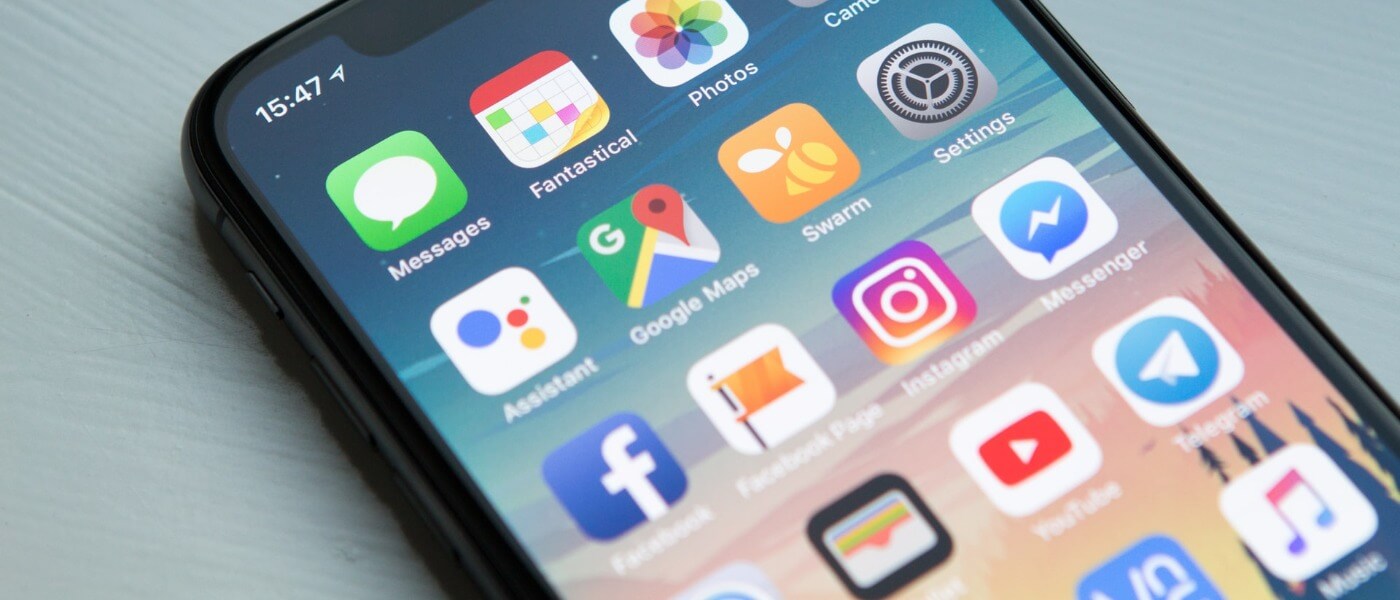Today’s app usage statistics show that the connection people have with their mobile devices is unbreakable. Nearly everyone has a phone that we use for shopping, education, finances, and connecting with others.
Although some apps are there for our leisure, such as TikTok, Instagram, gaming apps, there are some apps that help people work remotely, such as Zoom, or even learn a new language. In the UK, 84% of adults have a smartphone, and these are the apps they like to use.
Fundamental App Usage Statistics (Editor’s Choice)
- UK residents are using an average of 2.9 GB of data per month.
- In the UK, the average screen time per day is 3 hours and 23 minutes.
- WhatsApp had the most daily active users in the UK in 2020.
- In 2020, TikTok was the most downloaded app in the UK and globally.
- In the UK, the average daily time spent on social media sites is 49 minutes.
- Zoom was the most downloaded iPhone app in the UK in 2020.
Mobile Phone Usage Statistics in the UK
Smartphones are a necessity, so much so that a majority of adults in the UK own a smartphone and spend an average of over 2 GB of data each month on the internet.
1. 84% of UK adults own a smartphone.
(Finder)
Mobile devices like smartphones have become an integral part of people’s lives. According to smartphone usage statistics, approximately 84% of UK adults own a smartphone in 2020. When it comes to age groups, those aged 16 to 24 are most likely to have mobile internet, while those aged over 65 are less likely to access online content.
2. UK residents are using 2.9 GB of data per month on average.
(Finder)
Additionally, 67% of UK residents don’t usually spend all their data, while 7% need to purchase additional data. The amount of data users consume per month depends on the type of activities they perform on their phones. For example, according to smartphone application usage statistics, watching videos in HD will quickly consume your data allowance.
3. The market share for Android phones in the UK is 48.25%, while for iPhones, it’s 51.15%.
(Statista, Statcounter)
The market share of Android and Apple is nearly similar. However, smartphone usage statistics show that iPhones are slightly more present on the market. In March 2021, Android’s market share was 48.25%. For Apple, it was 51.15%. It seems the market is quite divided on these two major types of phones.
4. EE is the most popular mobile phone provider in the UK.
(Statista)
As of the first quarter of 2021, 22% of people in the UK use EE. The service consistently has high customer satisfaction ratings among its users, largely due to its 4G network that covers 97% of the indoor areas in England. Even the cheapest EE subscription allows for 60 Mbps, and the company also offers a 5G network for customers in larger cities.
5. The average daily screen time in the UK is 3 hours and 23 minutes.
(Elite Content Marketer)
Application usage statistics in the US show a slightly higher screen time at 3 hours and 43 minutes. Additionally, the average screen time varies in each generation. For example, Gen Zers have the highest average screen time of 29 hours per week. On the other hand, Millennials are right behind, with 12 hours and 20 minutes of screen time per week.
6. Brits spend an average of 49 minutes each day on social media sites.
(Finder)
People are so preoccupied with social media that they spend about 49 minutes each day on those platforms. According to mobile app usage statistics for 2020 in the UK, Facebook, Twitter, Instagram, and TikTok are the most commonly used platforms. In fact, 70% of UK adults have a social media account. Based on this data, 1 in 5 minutes spent online is spent on social media.
7. The weekly average time spent on social media is 14 hours and 26 minutes.
(Tecmark)
According to the latest app usage statistics, the average time people spend on social media is 14 hours and 26 minutes per week. Other categories are not even close. Productivity takes up to 2 hours, reading and reference take up to 1 hour and 54 minutes, and entertainment takes up to 1 hour and 41 minutes.

App Usage Statistics in the UK
There are so many apps available on the market, yet UK citizens prefer some more than others. Ever since the pandemic started, the NHS COVID-19 app became the best health app in the UK. However, TikTok remains to be the most downloaded app globally as well as in the UK.
8. In 2020, WhatsApp Messenger had the most daily active users in the UK.
(Statista)
That year, WhatsApp Messenger had a little over 3 million daily active users in the UK. Next to WhatsApp, the most used apps were Facebook, with over 2.6 million daily active users, and Messenger, with a little over 2 million daily active users. Skype and Instagram take up the rest of the spots in the top five list.
9. 24% of people can’t go without WhatsApp.
(Statista)
It’s hardly surprising that WhatsApp is the most needed app among Brits. It was named the app people could do least without in the first quarter of 2020, according to mobile app usage statistics. Facebook is in second place, with 15% and Instagram in third, with 10% of people claiming it’s the most necessary app on their phone.
10. 74.5% of the entire UK population is on Facebook.
(NapoleonCat)
Facebook app usage stats show that a large portion of UK residents are on Facebook. That’s approximately 50,530,000 Facebook users in June 2020. Among these users, 53.2% are women, and people aged 25 to 34 are the largest group of users.
11. Show My Homework was the leading children education app in 2020.
(Statista)
Since schools have closed during the lockdowns, children started going to online classes. This brought on an increase in the download of educational apps among kids. Show My Homework tops the list of the most popular apps for children, with 38% of UK children downloading and using it.
12. Duolingo saw a 132% increase of users in the UK in 2020.
(BBC)
Most people in the UK have decided that they want to learn a new language to make their days productive during lockdown. This is one of the primary reasons why Duolingo’s new downloads in the UK were twice the global figure.
App Download Statistics
Trends in 2020 show an increase in the download of educational apps due to the absence of face-to-face learning. In the following statistics, we’re going to look at which apps top the list in various categories.
13. The UK saw a 150% increase in downloads of educational apps in 2020.
(Business of Apps)
App download statistics show that people were willing to learn during the pandemic, so much so that the number of downloads of educational apps increased by 150% in the UK. Australia is the only country that beat the UK, with a 190% rise in downloads.
14. TikTok had 22 million downloads in the UK in 2020.
(Business of Apps)
Becoming the most downloaded app in 2020 in the UK, TikTok became so popular that it had 22 million downloads in the UK alone. The NHS COVID-19 app is right behind with 20 million downloads.
15. TikTok was the most downloaded app globally in 2020.
(Forbes)
WhatsApp and TikTok are in competition for most downloads globally. At the moment, TikTok, the video-sharing social network, has the most downloads, not just in the UK but all over the world. It has approximately 850 million downloads and 689 million active monthly users.
16. The NHS COVID-19 app had 20 million downloads in the UK in 2020.
(Business of Apps)
The pandemic made many question their health. Naturally, people turned toward mobile apps to check whether they have COVID-19. Looking at health app usage statistics, it’s clear that the NHS COVID-19 app was the best health app in the UK in 2020.
17. The BBC News app was the most downloaded news app in 2020.
(Press Gazette)
In 2020, the most downloaded news app was BBC News, with over 2.2 million downloads. The Sky News app was also popular, with 1.1 million downloads, and the Guardian and Mail Online were also among the top 10 news apps downloaded in the UK that year.

Android and iOS App Usage Statistics
The Android and iOS app markets are slightly different. Regardless, games are super popular in both stores. Zoom was the most downloaded work-related app for iPhones in 2020, and Among Us is the best gaming app in 2021.
18. Among Us is the most downloaded Android game in 2021.
(Statista)
Even though it was made in 2018, Among Us only became popular during the pandemic. According to gaming app usage statistics for Android, it was one of the most popular games in 2021. It gives people a unique multiplayer experience. However, it was eventually removed from the top spot and only had 257,000 downloads in April 2021.
19. Picture This: Plant Identifier is the leading educational app for iPhones in the UK.
(Similarweb)
Picture This: Plant Identifier topped the list of the most popular iPhone apps in the education category in the UK. As is stated in the name, this app is used to identify plants. Next in line were Oh My Homework and Duolingo.
20. Among Us is the most popular game for iPhone owners in January 2021.
(Similarweb)
iPhone users also love gaming. That being said, Among Us beat all other games for iPhones when it comes to popularity, mobile app usage statistics in 2021 show. In January 2021, it had 655,129 downloads.
21. Zoom was the most downloaded iPhone app in the UK in 2020.
(Daily Mail)
With the COVID-19 pandemic going on, a lot of people lost their jobs. Luckily, there are jobs you can still do from home, such as jobs in digital marketing. As a result of remote working, virtual means of communication came in handy.
That’s the reason why, according to iPhone app usage statistics, Zoom became so popular in 2020. It allows instant communication, it’s stable, and it has various functions that many companies can use to get in touch with their managers and teams via online conference meetings.
App Store Statistics
There are millions of apps on Google and Apple stores, with thousands being released daily. The most popular apps are games. Today, creating an app can cost about £38,000, and the total industry is expected to rise to $935.2 billion globally.
22. At least 88,000 new Android apps are released each month on the Google Play Store.
(Statista)
Thanks to the most downloaded Android apps, more developers are inspired to create new mobile apps. Since March 2019, the lowest number was recorded in February 2021 when 88,500 new Android apps were released. On the other hand, the highest number was in March 2019 when 141,400 Android apps were released on the Google Play Store.
23. Games are the most popular app category on Apple’s App Store.
(Business of Apps)
With games making up 21.8% of the apps on the App Store, there are more games on there than anything else. Next to games, the most popular iPhone apps are in the business category, making up 10.1% of the apps on the App Store. Lastly, education and lifestyle apps are also popular.
24. As of November 2020, Apple’s App Store has 4.3 million games and apps.
(Business of Apps)
With the way the mobile app usage statistics in 2020 is going, it’s no surprise that both Apple and Google stores have a variety of apps to offer. While there are 2.9 million apps and games in the Google App Store, the App Store has 4.3 million apps and games. The top category is gaming, with the number of apps in this category increasing from 50,000 in 2009 to 935,000 in 2020.
25. Creating a single-platform app can cost up to £38,000.
(Business of Apps)
If you’re interested in developing an app, but you don’t think you can do it alone, you should know that hiring a developer can cost up to £38,000. Creating top mobile apps isn’t easy. This is the pricing for creating an app from scratch, with a custom user interface, a user account, in-app purchases, and other features.
26. By 2023, mobile apps are projected to generate more than $935.2 billion globally.
(Statista)
Due to the massive use of mobile apps, app revenue statistics show that the global revenue from mobile apps is $693 billion. However, this number is projected to reach over $935 billion globally by 2023. This includes in-app advertising and paid downloads.

App Usage Statistics in the UK — The Takeaway
We can’t deny that our day-to-day lives involve the use of mobile apps. From the time we wake up, we check our emails and social media accounts on our phones using mobile apps. Before we go to bed, we might check out a video or two, again, using mobile apps. That is statistics on mobile app usage have shown an upward trend.
Our dependence on mobile apps became even more intensified during the COVID-19 pandemic in 2020 when people were forced to work and study from home. Others were just scrambling around on the Play Store and App Store, looking for new forms of entertainment.
Globally, there are thousands of apps released each day, and users can’t wait to discover something new and exciting. With this app market and its development, there is a huge chance that the global app market will reach $935.2 billion by 2023.
Frequently Asked Questions
There are many categories of mobile apps. Globally, TikTok was the most downloaded app in 2020, while WhatsApp is right behind it. Once TikTok was banned in India, Telegram took the lead with the most downloads globally.
Based on categories, Among Us is the most downloaded gaming app, Mi Fit is the most downloaded health and fitness app, and Google Classroom is the most downloaded educational app.
At the moment, the most popular app in the world is TikTok, with approximately 850 million downloads and 689 million active monthly users. It’s a video-sharing social networking service used to create short videos.
Based on social media usage statistics by country, TikTok has the most monthly active users in the US. All generations love it. It has catchy tunes, fun dancing trends to follow, and can make potentially anyone famous. However, TikTok is not used only for fun. People are promoting businesses, sharing ideas, helping each other learn, and are showing support to those in need.
The most downloaded apps of all time are WhatsApp and Facebook. At the moment, WhatsApp has 5 billion downloads in Google Play Store, and Facebook has more than that. Both of these apps are free to download and are primarily used to chat and catch up with friends and family. When it comes to numbers for 2020, WhatsApp beats Facebook with 600 million downloads.
The COVID-19 pandemic changed the way people use mobile apps. Until recently, most users only liked games and social media apps. Nowadays, the demand has changed, as is evident in smartphone app usage statistics. Food delivery and online shopping apps are now on the rise, among other things.
Other types of apps that are in demand are healthcare apps. People want to know how safe they are during the pandemic, and downloading a health app is one of the best ways to do it.
Different age groups are using mobile apps in various ways. Regardless, Gen Zers are the age group with the highest screen time. Additionally, 21% of people aged 18 to 34 typically open their apps more than 50 times each day.
According to app usage statistics, Generation X is the second biggest mobile app user, with 10% of them opening their apps over 50 times. When it comes to baby boomers and older generations, only 2% of them use their mobile apps more than 50 times a day.

